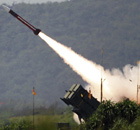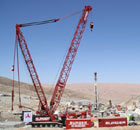Foreign and Military Affairs
China rejects US clean energy probe
By Wan Zhihong (China Daily)
Updated: 2010-10-18 06:50
 |
Large Medium Small |
BEIJING - China hit back on Sunday at US plans to investigate its clean energy policies, calling the move "groundless and irresponsible".
The US decision is "unjustified and groundless", Zhang Guobao, head of the National Energy Administration, told a media conference on Sunday.
If Washington insists on an investigation, it will "hurt the US itself ", Zhang said.
| ||||
The US Treasury said it was withholding its semi-annual report on foreign exchange rate practices until after crucial summits in November to give diplomatic pressure on China more time to achieve results.
On US plans to investigate China's clean energy polices, the Ministry of Commerce said on Saturday that allegations that China violated World Trade Organization (WTO) rules in developing the sector were "groundless and irresponsible" and it regretted that the US government agreed to open an investigation.
"It is sending a wrong signal of trade protectionism to the rest of the world," the ministry said in a website statement.
US trade officials said on Friday that they will investigate whether Chinese support of clean energy is a violation of WTO rules, as requested by the United Steelworkers union.
The union accused China of giving billions of dollars of subsidies to domestic producers, discriminating against foreign firms and goods and restricting foreign access to critical raw materials.
China's clean energy market is open to all foreign players, and many foreign companies have built a presence in the market, the energy administration's Zhang said.
For instance, China's wind power equipment market was worth 85 billion yuan ($12.7 billion) in 2009, of which 21 percent had foreign company involvement, he said.
China's clean energy market has also brought opportunities to US companies, among them General Electric whose wind turbines exported to China have reached accumulative capacity of 1,130 megawatts, he added.
In contrast, China has only exported three wind turbines to the US, Zhang said.
A number of domestic wind power companies are also using many US-made products, such as bearings from US producer Timken, and lubricants from ExxonMobil and Dow Chemical, he said.
Chinese subsidies to new energy companies are much smaller than those of the US government, Zhang said.
He said he "sincerely hopes for further dialogue" with US parties on green energy partnership.
The US has pressed China continuously over its emissions, despite the fact that China is making strenuous efforts to develop green energy to reduce them, he added.
China has been the world's most dynamic market for green energy development, according to a leading energy body. The Global Wind Energy Council said China is likely to surpass the US as the leader in wind-power capacity by the end of this year.
New energy is indispensable for the country to achieve its two primary targets in energy and the environment, said analysts. China aims to increase the use of non-fossil energy to 15 percent of its primary energy consumption by 2020. It also pledged to reduce its carbon intensity by 40 to 45 percent by 2020 from the 2005 level.
Compared with conventional energy like coal and oil, green energy is still relatively small-scale but these industries are expanding at an unprecedented pace, said Li Junfeng, deputy director of the Energy Research Institute under the National Development and Reform Commission.
The country's wind power industry has seen more than 100 percent annual growth over the past five years, Li said.
AP, Reuters contributed to this story.










